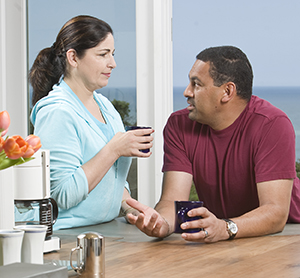A
B
C
D
E
F
G
H
I
J
K
L
M
N
O
P
Q
R
S
T
U
V
W
X
Y
Z
Click a letter to see a list of medical procedures beginning with that letter.
Click 'Back to Intro' to return to the beginning of this section.
ADHD and Your Family
When a child has ADHD, the parents, child, teachers, and doctors need to work together as a team to understand the disorder and develop the appropriate treatment plan to allow the child to reach their full potential. A routine from wake-up time to bed time and simple house rules are needed. Children with ADHD need consistent rules that they can understand and follow.
Taking care of a child with ADHD might strain other relationships in the home. This doesn’t have to happen. Each member of the family can help build lasting bonds. That way, life can get better for everyone.
How you may feel
If you have a child with ADHD, you may feel guilty, worried, and tired. Try to get enough rest and do some things you enjoy. Ask family and friends for support.
You and your partner
It’s easy to blame each other. You may not agree on the child’s diagnosis, treatment, or discipline. Finding answers isn’t easy. But make an effort to talk each day. Now's the time to build new trust within your relationship.

Nurturing your other children
You may devote a lot of time and effort to the child with ADHD. As a result, your other children may feel left out. In an age-appropriate way, explain ADHD to your other children. Do your best to spend one-to-one time with each of them. Try to use that time to focus solely on that child. Instead of using up your energy, you may find that these moments make your relationships stronger and help build your own emotional reserves.
Parent’s role
-
For yourself. Recharge and relax. Free up some time by finding a caregiver who understands ADHD. Ask a counselor or your support group about people who might be able to supervise your child. When parents learn about ADHD and which parenting approaches work best, they can help kids improve and do well.
-
For your marriage. Try to respect any differing opinions. Also, spend time alone as a couple. Talk about things other than your child and coping with ADHD.
-
For your other children. Do things with them. Ask about their hobbies, desires, and fears. Let them know they matter to you. Ask them how ADHD has impacted them and what strategies they would suggest for the family to help each other manage ADHD. Listen and try to use their ideas in addition to suggesting proven concrete strategies that will also help them relate to the child with ADHD.
-
Reward everyone’s efforts to act like a family.
-
If the stress you're experiencing seems unmanageable, consider marital or family counseling. Counseling can help you to:
-
Make your marriage stronger.
-
Find better ways to handle problematic behavior.
-
Improve interactions with the child who has ADHD.
-
Make family relationships stronger.
-
Resolve family conflicts.
The future holds promise
Your child’s ADHD symptoms are likely to change and evolve as they mature. With time and ongoing guidance, your child can learn to manage their traits. It's important to understand ADHD's impact on the entire family. And to use interventions that respect the needs of all family members. This will help the child with ADHD become a happy and successful adult. And it will help them have continued family support.
Online Medical Reviewer:
Daphne Pierce-Smith RN MSN
Online Medical Reviewer:
Lalitha Kadali
Online Medical Reviewer:
Michelle Anderson DNP
Date Last Reviewed:
5/1/2025
© 2000-2026 The StayWell Company, LLC. All rights reserved. This information is not intended as a substitute for professional medical care. Always follow your healthcare professional's instructions.